新人教版PEP五年级英语上册复习资料(全)培训讲学
PEP小学英语五年级上册讲义全册

PEP小学英语五年级上册讲义全册PEP小学英语五年级讲义Unit 1 Part ALet’ learn1.词汇(要求四会)young funny kind strong / / / / / / / / short thin tall old/ / / / / / / / young (反义词) _________ thin (反义词)__________ short(反义词) _________ 和___________funny(名词)_________ strong(反义词)___________ who’s =_______ ________(完全形式)2. 重点句型一、Who的用法(1)问“姓名”-- Who is that man ?-- That is Mr Carter.(2) 问“关系”-- Who is that girl ?-- She is my elder sister.(3) 问“职业”-- Who is he ?-- He is a doctor .练习:(1).She is our teacher. (划线提问)_______________________________________________ (2).His sister is a nurse.(划线提问)_______________________________________________(3)-- ________ is that girl ?-- That girl is Sarah.(4)They are my mother and my father._______________________________________________ 二、.描述他人的体貌特征或性格特点:主语+be动词+表体貌特征或性格特点的形容词课文链接:He is thin and short. He is very kind.(译成中文) _______________________________________________ Be动词随着主语的变化而变化Eg: I______ _______ ________ _________.我长得又高又强壮。
新人教版PEP小学英语五年级上册全册知识点复习PPT课件

• 第五六单元 1.There be句型包括 There is a …后面跟名词单数,表示一个。例 如:There is a mirror on the wall. There are some/many…后面 跟名词复数,表示多个。例如: There are two end tables near the bed. 2. on与over的区别 on: 在。。。上面,表示与下面的物体相互接触,紧挨着。 over: 在。。。上面,表示与下面的物体没有接触,悬空着。 3. 以系动词(am, is, are)和助动词(can, do)等开头的句子叫做 一般疑问句。 如: Is your sister a teacher? Yes, she is. / No, she isn’t. Are you a student? Yes, I am. / No, I’m not. Do you have new teachers? Yes, we do. / No, we don’t. Does Amy have new teachers? Yes, she does./ No, she doesn’t. Can you wash the clothes? Yes, I can. / No, I can’t.
• 5 今天星期几?星期二。 What day is it today ? It’s Tuesday. • 6 星期二你们有什么课? What do you have on Tuesdays ? • 7 我们有数学和科学课。 We have math and science. • 8 星期六你常常干些什么? What do you do on Saturdays ? • 9 我看电视做作业。 I watch TV and do homework. • 10 你怎么样? 我也做作业。 What about you ? I do my homework, too.
人教版pep小学英语五年级上册复习要点汇总课件(含单元作文共42张)
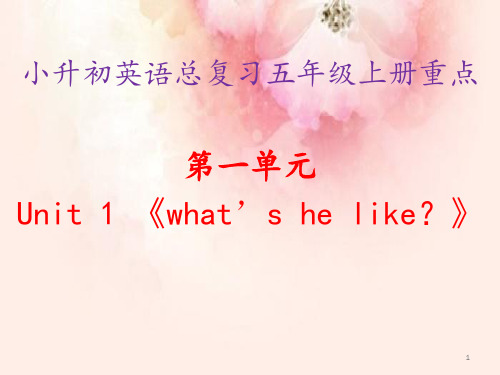
Saturday (Sat.)周六
weekend 周末(周六、日) wash my clothes 洗衣服
watch TV 看电视
do homework 做作业
reade weekend 在周末
play sports/do sports 做体育运动
6
重点作文 1、介绍自己、朋友或老师等熟悉的人物, 如:My …teacher/friend/…。 思路导引 (1)开头:交代人物的身份 I have a/an…He/She is… (2)中间:1)体貌 He/ She is tall/strong… He/She has …hair/eyes…
4
重点知识及语法
1、询问他人的外貌或性情:
-What’s +主语+ like? 答句:主语+is +性情/外貌的词。
2、一般疑问句的问与答:
Is he/she…?—Yes, he/she is. —No, he/she isn’t.
Do you know…? —Yes, I do. —No, I don’t
14
范文: My week My name is Li Ming. I go to school from Monday to Friday. I like Tuesdays and Thursdays, because I have music and PE. I often do my homework and read books on Saturdays. I often play ping-pong on XXXdays. This is my week. What about yours?
15
小升初英语总复习五年级上册重点
人教版PEP五年级英语上册复习资料(全)
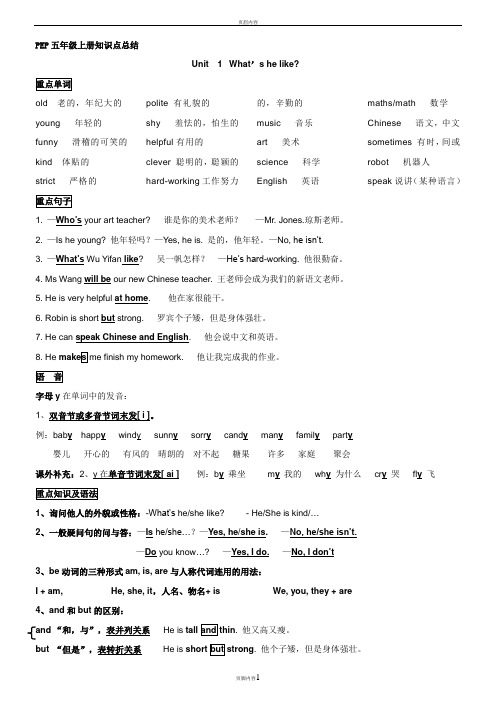
PEP 五年级上册知识点总结Unit 1 What ’s he like?old 老的,年纪大的young 年轻的funny 滑稽的可笑的kind 体贴的strict 严格的polite 有礼貌的 shy 羞怯的,怕生的 helpful 有用的 clever 聪明的,聪颖的 hard-working 工作努力的,辛勤的 music 音乐 art 美术 science 科学 English 英语 maths/math 数学 Chinese 语文,中文 sometimes 有时,间或 robot 机器人 speak 说讲(某种语言)1. —Who’s your art teacher? 谁是你的美术老师? —Mr. Jones.琼斯老师。
2. —Is he young? 他年轻吗?—Yes, he is. 是的,他年轻。
—No, he isn’t.3. —What’s Wu Yifan like ? 吴一帆怎样? —He’s hard -working. 他很勤奋。
4. Ms Wang will be our new Chinese teacher. 王老师会成为我们的新语文老师。
5. He is very helpful at home . 他在家很能干。
6. Robin is short but strong. 罗宾个子矮,但是身体强壮。
7. He can speak Chinese and English . 他会说中文和英语。
8. He他让我完成我的作业。
字母y 在单词中的发音:1、双音节或多音节词末发[ i ]。
例:bab y happ y windy sunn y sorr y cand y man y famil y part y婴儿 开心的 有风的 晴朗的 对不起 糖果 许多 家庭 聚会课外补充:2、y 在单音节词末发[ ai ] 例:b y 乘坐 m y 我的 wh y 为什么 cr y 哭 fl y 飞1、询问他人的外貌或性格:-What’s he/she like? - He/She is kind/…2、一般疑问句的问与答:—Is he/she…?—Yes, he/she is. —No, he/she isn’t.—Do you know …? —Yes, I do. —No, I don ’t3、be 动词的三种形式am, is, are 与人称代词连用的用法:I + am, He, she, it ,人名、物名+ is We, you, they + are 4、and 和but 的区别:and “和,与”,表并列关系 He is . 他又高又瘦。
最新人教版pep五年级英语上册复习资料(全)教学教材

PEP 五年级上册知识点总结Unit 1 What ’s he like?old 老的,年纪大的young 年轻的funny 滑稽的可笑的kind 体贴的strict 严格的polite 有礼貌的 shy 羞怯的,怕生的 helpful 有用的 clever 聪明的,聪颖的 hard-working 工作努力的,辛勤的 music 音乐 art 美术 science 科学 English 英语 maths/math 数学 Chinese 语文,中文 sometimes 有时,间或 robot 机器人 speak 说讲(某种语言)1. —Who’s your art teacher? 谁是你的美术老师? —Mr. Jones.琼斯老师。
2. —Is he young? 他年轻吗?—Yes, he is. 是的,他年轻。
—No, he isn’t.3. —What’s Wu Yifan like ? 吴一帆怎样? —He’s hard -working. 他很勤奋。
4. Ms Wang will be our new Chinese teacher. 王老师会成为我们的新语文老师。
5. He is very helpful at home . 他在家很能干。
6. Robin is short but strong. 罗宾个子矮,但是身体强壮。
7. He can speak Chinese and English . 他会说中文和英语。
8. He他让我完成我的作业。
字母y 在单词中的发音:1、双音节或多音节词末发[ i ]。
例:bab y happ y windy sunn y sorr y cand y man y famil y part y婴儿 开心的 有风的 晴朗的 对不起 糖果 许多 家庭 聚会课外补充:2、y 在单音节词末发[ ai ] 例:b y 乘坐 m y 我的 wh y 为什么 cr y 哭 fl y 飞1、询问他人的外貌或性格:-What’s he/she like? - He/She is kind/…2、一般疑问句的问与答:—Is he/she…?—Yes, he/she is. —No, he/she isn’t.—Do you know …? —Yes, I do. —No, I don ’t3、be 动词的三种形式am, is, are 与人称代词连用的用法:I + am, He, she, it ,人名、物名+ is We, you, they + are 4、and 和but 的区别:and “和,与”,表并列关系 He is . 他又高又瘦。
完整word版,2017新人教版PEP五年级英语上册复习资料(全)
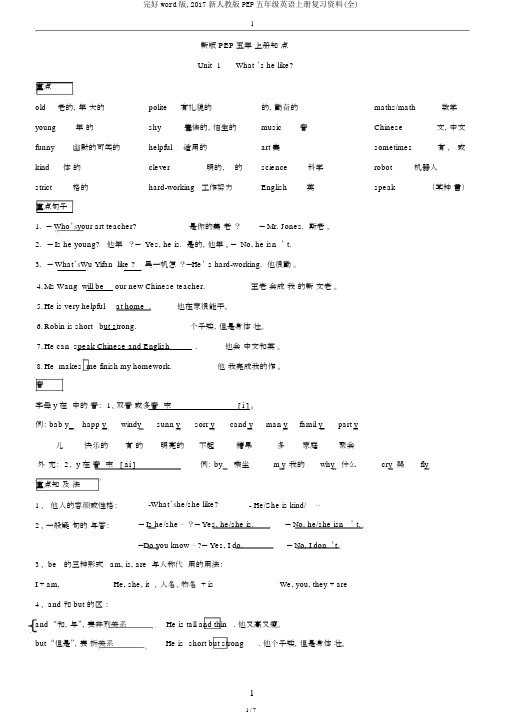
1新版 PEP五年上册知点Unit 1 What ’s he like?重点old老的,年大的polite有礼貌的的,勤奋的maths/math数学young年的shy羞怯的,怕生的music音Chinese文,中文funny幽默的可笑的helpful适用的art美sometimes有,或kind体的clever明的,的science科学robot机器人strict格的hard-working 工作努力English英speak(某种言)重点句子1. — Who’s your art teacher?是你的美老?— Mr. Jones. 斯老。
2.— Is he young? 他年?— Yes, he is. 是的,他年。
— No, he isn ’ t.3.— What’s Wu Yifan like ? 吴一帆怎?—He’ s hard-working.他很勤。
4.Ms Wang will be our new Chinese teacher.王老会成我的新文老。
5.He is very helpful at home .他在家很能干。
6.Robin is short but strong.个子矮,但是身体壮。
7.He can speak Chinese and English.他会中文和英。
8.He makes me finish my homework.他我完成我的作。
音字母 y 在中的音: 1、双音或多音末[ i ] 。
例: bab y happ y windy sunn y sorr y cand y man y famil y part y儿快乐的有的明亮的不起糖果多家庭聚会外充: 2、 y 在音末 [ ai ]例: by乘坐m y我的why 什么cry 哭fly重点知及法1、他人的容颜或性格:-What’s he/she like?- He/She is kind/⋯2、一般疑句的与答:— Is he/she ⋯?— Yes, he/she is.— No, he/she isn ’ t.—Do you know ⋯ ?—Yes, I do.— No, I don ’t3、 be 的三种形式 am, is, are 与人称代用的用法:I + am,He, she, it,人名、物名 + is We, you, they + are4、 and 和 but 的区:and “和,与”,表并列关系He is tall and thin . 他又高又瘦。
新PEP小学英语五年级上册总复习(重点+练习)PPT课件

A. How B. Who C. What
(
B
) 2. John A. like
_______ B. likes
Mondays C. have
and
Fridays.
( ) 3. Today is Wednesday. Tomorrow is ________.
C A. Friday B. Tuesday
What do you have on Tuesdays?
We have art class on Tuesday.
1. 抄单词:抄U2的单词共10个,每个一行。 2. 抄句子:抄U2的句子共4句,每句一行。 3. 复习:U3和U4的单词和句子,下次听写
Important points
ice cream 冰淇淋
Monday (Mon.) 周一 watch TV 看电视
Tuesday (Tue.) 周二 do homework 做作业
Wednesday (Wed.)周三 read books 看书
Thursday (Thur.) 周四 play football 踢足球
Friday (Fri.) Saturday (Sat.) weekend
Important points
4、He makes me finish my homework. 他让我写作业。 注意:上面make加了s,不是复数的意思。He 是第三人 称单数,后面的动词要加s。
*什么是第三人称单数? 第一人称:I (我) 第二人称:you (你,你们) 第三人称:he/ she/ it/ they/one’s name
4、时间介词的用法 on+具体某一天,如:on Monday/Tuesday… at+具体时刻,如:at 12 o’clock 在十二点整 in+大致时间,如:in 2014 在2014年
新人教版pep五年级上册英语总复习课件
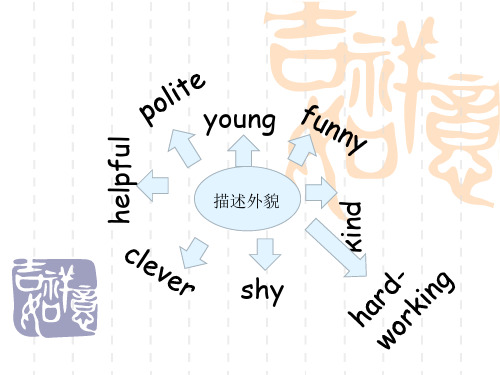
▪ 她很文静吗?
不,她很活跃。
-- Is she very quiet ?
▪ -- No ,she isn’t. She ’s very active .
▪ 她很严厉吗? 是的。 但是她很和蔼。
▪-- Is she very strict ?
▪-- Yes , she is . But she is very kind.
▪ /i:/
▪ -ea tea read eat repeat
语法
▪ 合成词
▪ Mon+day=Monday
▪ bed+room=bedroom
▪ Sun+day=Sunday
▪ bath+room=bathroom
Unit 3 What would you like?
▪ 单词 ▪ 食物: ▪ 三明治sandwich 蔬菜沙拉salad ▪ 汉堡包hamburger 茶 tea 冰激凌▪ice cream ▪ 特性:新鲜的fresh 健康的 healthy
Can you...?你会...?
肯定回答:Yes, I can. 否定回答:No,I can’t.
Read the words together.
cook
playБайду номын сангаасbasketball
swim
Speak English
play ping-pong
Some & any “一些”
some 常用在肯定中,而any 则常用在否定 句和疑问句中 。
Can you…? cook
Can you…? clean the classroom
Can you…?
read books
2020新人教版PEP五年级英语上册复习资料(全)(1)
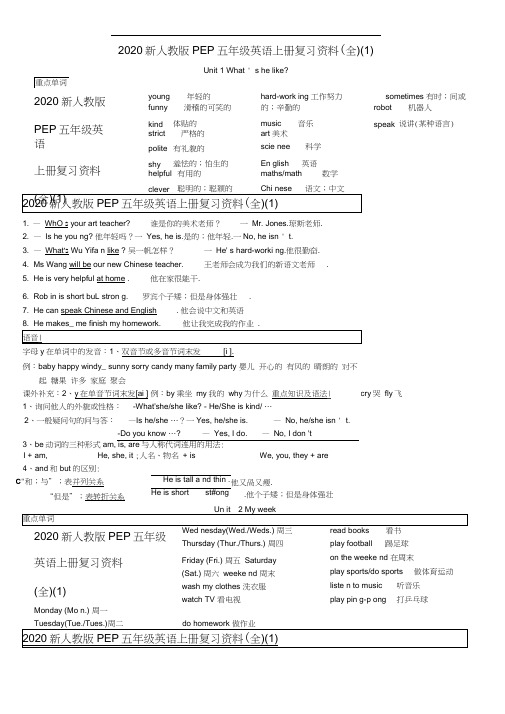
2020新人教版PEP 五年级英语上册复习资料(全)(1)Unit 1 What ' s he like?2020新人教版PEP 五年级英语上册复习资料(全)(1)1. — WhO s your art teacher?谁是你的美术老师?一 Mr. Jones.琼斯老师.2. — Is he you ng? 他年轻吗?一 Yes, he is.是的;他年轻.一No, he isn ' t.3.— What 's Wu Yifa n like ? 吴一帆怎样? 一 He' s hard-worki ng.他很勤奋. 4. Ms Wang will be our new Chinese teacher. 王老师会成为我们的新语文老师 .5. He is very helpful at home . 他在家很能干.6. Rob in is short buL stron g.罗宾个子矮;但是身体强壮.7. He can speak Chinese and English . 他会说中文和英语 字母y 在单词中的发音:1、双音节或多音节词末发 [i ].例:baby happy windy_ sunny sorry candy many family party 婴儿 开心的 有风的 晴朗的 对不起 糖果 许多 家庭 聚会课外补充:2、y 在单音节词末发[ai ] 例:by 乘坐 my 我的 why 为什么 重点知识及语法| 1、询问他人的外貌或性格: -What'she/she like? - He/She is kind/ … 2、一般疑问句的问与答:—Is he/she …?一Yes, he/she is.— No, he/she isn ' t. -Do you know …? — Yes, I do.— No, I don 't 3、be 动词的三种形式am, is, are 与人称代词连用的用法:2020新人教版 PEP 五年级英语上册复习资料(全)(1) young 年轻的hard-work ing 工作努力 sometimes 有时;间或 funny 滑稽的可笑的 的;辛勤的 robot 机器人 kind 体贴的music 音乐 speak 说讲(某种语言)strict 严格的 art 美术polite 有礼貌的 scie nee科学shy 羞怯的;怕生的 En glish 英语helpful 有用的 maths/math 数学clever 聪明的;聪颖的Chi nese语文;中文I + am, He, she, it ;人名、物名 + is4、and 和but 的区别: We, you, they + arecry 哭 fly 飞2020新人教版PEP 五年级Thursday (Thur./Thurs.) 周四 read books play football看书 踢足球英语上册复习资料 (全)(1)Monday (Mo n.) 周一 Friday (Fri.) 周五 Saturday (Sat.) 周六 weeke nd 周末 wash my clothes 洗衣服 watch TV 看电视 on the weeke nd 在周末 play sports/do sports 做体育运动liste n to music 听音乐 play pin g-p ong打乒乓球Tuesday(Tue./Tues.)周二do homework 做作业1. — What do you have on Thursday g? 星期四你们上什么课?—I have math, En glish and music.我们上数学、英语和音乐课 .2. — What do you do on Thursdays, Gran dpa?爷爷;星期四你要做什么? —I have a cooking class with your grandma. 我和你奶奶去上烹饪课 . 3. — Do you often read books in this park?你经常在这个公园看书吗?—Yes, I do. 是的 —No, I don ' t 不是 4. Look at my picture.看我的图片. 5. You look tired . 你看起来很累. 6. You should play sports every day. 你应该每天做运动 . 语 音 字母组合ee, ea 在单词中的的发音:[i:]例:feetbeefmeet seefeedtea read eat rep eat 脚牛肉遇见看见喂养茶阅读吃重复注:1、ee 组合绝大部分发长音[i:];只有少部分发短音[i ];如:coffee 咖啡2、ea 字母组合除了发[i:];还有可能发[e ]等发音;如:bread 面包;或者发[ei ];如:great 好极了 重点知识及语『1、-询问做什么事 /活动:一What do you do …?— I often play ping-pong …\询问星期几上什么课: 一What do you have on …? — We have En glish class …2、 一般疑问句的问与答: 一Do you often read books? — Yes, I do . — No, I don ' t.3、_on+具体某一天(年月日;星期) ;如:on Monday/Tuesday … 课外*顷+具体时刻(…点钟);如:at 12 o 'lock在十二点整补充:n+ 大致时间(年月;早中晚) ;如:in 2014 在 2014 年 in the morning/afternoon/evening4、 play + 球类、棋类、娱乐活动 ;如: play football/ping-pong 补充:play + the + 乐器(第四单元知识);如: play the pipa/piano/violin …Unit 3 What would you like?重点单词]2020新人教版PEP 五年级英语上册复习资料(全)(1)1. — What would you like to eat ?你想吃什么?一A sandwich, please.请给我一个三明治 —What would you like to drink _____ ? 你想喝什么? 一 I ' d likesome water.我想喝点水.2. — What ' s your favourite food? 你最喜欢吃什么食物?一 Noodles. They are delicious. 面条.面条很好吃3. My/His /Her favourite food is fish.4. I ' mungry/thirsty . 我饿 /渴了 .5. I don ' t like beebut chicken is OK.6. Onions are my favourite vegetable.carrots. 我喜欢吃蔬菜但不喜欢胡萝卜 ow 在单词中的发音:[au ] flow er 花 wow 哇 dow n 向下slow 慢的 snow 雪 yellow 黄色 window 窗户1、询问想要吃 / 喝什么:一 What would you like to eat/dri nk? — I 'like …2、 询问最喜欢的事物:一 What s your favourite food/vegetable/ …? — My favourite food/ …is …/I like …3、 名词复数的规则变化:2020新人教版 PEP 五年级英语 上册复习资料 (全)(1)hamburger 汉堡包 sweet 含糖的;甜的 onion 洋葱 tea 茶 hun gry 饿的 milk 牛奶san dwich 三文治thirsty渴的;口渴的 bread 面包salad 沙拉 favourite 特别喜爱的 beef no odles 牛肉面 fresh 新鲜的food 食物 fish san dwich鱼肉三healthy 健康的 drink 喝;饮 明治delicious 美味的; carrot 胡萝卜tomato soup西红柿汤hot 辣的;辛辣的 chicke n鸡肉我/他 /她最喜欢的食物是鱼 我不喜欢牛肉但是鸡肉也可以 洋葱是我最喜欢的蔬菜. 7. I like vegetables but not 语音 | 字母组合 例:[au ] cow 奶牛how 如何;怎样 now 现在 snowy 下雪的 tomorrow 明天(1)直接加 s ; (2)以 s, x, sh, ch 结尾的;加 es ;女口; buses boxes sandwich es(3 )以 o 结尾;有生命的加 es ;女口; potatoes tomato es ;无生命的加 s ;女口; photo s pia no§ zoos (4)以辅音加y 结尾;改y 为i 再加es ;女口; famil ies babies ;以元音加y 结尾;直接加s ;如;boy s day s (5 )以f 或fe 结尾;改f 为v 再加es ;女口 knife-kni ves 小刀 leaf-lea ves 树叶 4、some+ 可数 /不可数名词例:some apple s (可数)some water/rice/juice/bread/ …(不可数)课外补充:不可数名词(词后不可以加 -s/es ;所接动词用单数is ) 液体 water milk tea orange (桔汁)coke juice气体 air (空气)食物foodrice breadfruit肉类 meat (肉) fish beef chickenpaper (纸) time music weather 重点单词2020新人教版PEP 五年级 英语上册复习资料 (全)(1)sing English songs 唱英文歌 play2020新人教版PEP 五年级英语上册复习资料(全)(1)1. We ' have an English party next Tuesday! 我们下周二将举行英语派对 .2. — What can you do 虹the party? 你能为派对做些什么呢?一 lean si ng En glish son gs.我能唱英文歌3. How/What about you? 你呢?4. Can you do any kung fu? 你会打功夫吗一 Yes, I can. 是的;我会. 一No, I can 't.5. No problem . I can help you. 没问题.我会帮你.6. I can play ping-pong, but I can t swim. 我会打乒乓球;但我不会游泳7. Please send me an email at robin@.请给我发邮件; 邮箱 robin@.语 音字母组合oo 在单词中的发音:[u ] ; [ u:]例:[u ] loo k 看 good 好的 boo k 书 coo k 烹饪 woo d 木头 foo t 脚助记口诀:1.看look 好good 书book ;砍柴 wood做饭cook 洗脚foot.2. 押韵记忆: Look good book, cook wood foot.[u: ] ball oon 气球 foo d 食物 zoo 动物园noo dies 面条注:字母组合 oo 发音少数发短音[u ]:多数发长音[u:]. 1、 询问对方会做什么事情 :一What can you do? — lean play the pipa.2、 c an 句型的否定句:lean t play the pipa.3、 can 句型的一般疑问句的问与答 :一Can you do any kung fu? — Yes, I can./No, I can t .4、 、play + the + 乐器; 例 play the erhu /pipa /piano …play + 球类、棋类、娱乐活动 ;例 play basketball/football/ping-pong…5、s ome 与any 的异同:不同之处:」"some+可数名词复数/不可数名词(用于肯定句中)例: I can do some kung fu. 我会打功夫. any+可数名词复数/不可数名词(用于否定句或疑问句中) 例:I can t do any kung fu. 我不会练武术.Can you do any kung fu? 你会练武术吗?Unit 5(天气)rain snow moneyUnit 4 What can you do? the pipa 弹琵琶 do kung fu 打功夫 draw carto ons 画漫画 swim 游泳 speak En glish 说英语cook 烹饪;烹调 play basketball 打篮球play pin g-p ong 打兵乓球draw pictures 画画clea n the classroom 打扫教室2020新人教版PEP五年级英语上册复习资料(全)(1)photo 照片; pla nt植物 water bottle bike 自行车; 相片 水瓶 脚踏车in front of 在 ...... 前面 beside 在旁边(附近) betwee n 在 ..... 中间 beh ind 在 .... 后面above 在 .... 上面 so many 许多 their 他们的 lots of 许多dirty near house 肮脏的 在附近房屋2020新人教版PEP 五年级英语上册复习资料(全)(1)1. Your room is really nice ! 你的房间真漂亮!2. There is a big bed.3.我的电脑在书桌这里.4. This is_ my room.这是我的房间.5. There are so many picture6. My father can draw 有一张床. 7 . — Where is the ball? 球在哪里? 8. There is a tree in front of the house.9. I live near the nature park. |] here. 这有许多照片. very well .我父亲画的很好. —It 's in front of the dog. 在房子前有棵树. 在狗的前面. 字母组合ai, ay 在单词中的发音: 例:rainy 下雨的 rain bow 彩虹pai nt Mond ay 周一 day 天;日子 tod ay 今天我住在自然公园附近. [ei ] 涂色 wait 等待 may 可以 say 说 way 路;方法 birthday 生日 (1) There be 句型的动词就近原则: 例: There is a bed , a desk, two photos in my room. ,a bed and a desk in my room. There are two photos There is a clock. There are lots of flower 村. the dog. “许多 _ "许多 .... ” 例: There are many tree s in the forest. much + 不可数名词 "许多…....”例:I drink much water every day. 我每天喝很多水. 我爸爸画的很好 这本书非常好. 2、询问方位或地点:一 Where is the ball? — It ' insfront of 3、 lots of + 可数/不可数名词 =a lot of + 可数/不可数名词 比较:many + 可数名词复数 4、动词 +very well 例: My father can draw very well 比较: be (am/is/are)+very good 例:The book is very good Un it 6 2020新人教版PEP 五年级 英语上册复习资料 (全)(1)hill 山丘;小山 river 河;江moun ta in 高山;山岳 lake 湖;湖泊duck 鸭子 village 村庄;村镇 an imal 动物 house 房屋;房子;住宅 high 高的 tree树;树木;乔木childre n孩子们bridge 桥(child 的复数形式 go boati ng 去划船nature park自然公园people 人;人们rabbit 兔子)2020新人教版PEP 五年级英语上册复习资料(全)(1) 2. —Is there a river in the forest? 森林里有河流吗? park is so quiet ! 自然公园这么安静! 4. There_aren_' many people . 没有许多人. 5. — Are there |any tall building |s| in the nature park?—Yes, there are. 是; 有的. 一No, there aren6. — How many? 多少? 一Two.两个.7. Robin is a! Mr. Jones 'house. 罗宾在琼斯先生的房子里 字母组合ou 在单词中的发音:[au ]—Yes, there is.是; 有的. —No, there isn ' 3. The nature自然公园例有高楼吗? ' 不;没有•例:hou se 房屋;房子mouse 老鼠sou nd 声音;听起来cou nt 数数提示:字母组合ow也有些发[au ];例:cow奶牛how 如何;怎样dow n向下重点知识及语法there be句型的一般疑问句的问与答:—Is there a lake? —Yes, there is. —No, there isn '.—Are there any animal s? —Yes, there are. —No, there aren '.2、there be (is, are )句型的单复数形式(具体见Unit 5的重点知识及语法):例: There is a nature park near the house. There are many duck s on the lake.3、s ome与any在肯定句、否定句及问句中的用法:Lsome+可数名词复数/不可数名词(用于肯定句中)例:There are some books on the desk."_any+可数名词复数/不可数名词(用于否定句或疑问句中)例: There aren 'any people in the forest.Are there any tall build ings in the n atures park?4、people 人;人们(集体名词;明为单数;实为复数;词末不能加-s)例:There are many people in the park.。
人教版(PEP)小学英语五年级上册复习课件

1.单词 星期一到星期天,首字母要大写。 Monday 星期一 Tuesday星期二 Wednesday 星期三 Thursday星期四Friday星期五 Saturday 星期六 XXXday星期日 weekend 周末 2. 短语
wash my clothes洗衣服watch TV看电视 do homework做家庭作业read books读书 play football踢足球 play sports做体育运动 every day每一天do housework做家务
1.单词和短语
clock时钟plant植物 water bottle水瓶 bike自行车 photo相片 in front of在…前面 between在…之前 above在…上面 beside在旁边behind 在…后面
1.单词
forest森林river河流lake湖泊mountain 高山hill山丘tree树 bridge桥 building 建筑物village乡村house房子 2.短语 go boating 划船 nature park 自然公园
PEP五年级上册
1. 描述人的外貌单词 old 年老的 young年轻的 tall 高的 short 矮的 strong 强壮的 thin 瘦的 2.描述人的性情的单词 funny滑稽的 kind 和蔼的 strict严格的 polite 有礼貌的 hard-working 工作努 力的 helpful能干的clever 聪明的shy 害羞的
food食物 onion洋葱
Unit 4 What can you do?
1.单词
dance跳舞cook烹饪swim游泳party集会 2.短语
sing English songs唱英文歌曲play the pipa 弹琵琶do kung fu练武术draw cartoons画漫 画play basketball打篮球 play ping-pong打 乒乓球 speak English说英语
2020新人教版PEP五年级英语上册复习资料(全)(1)
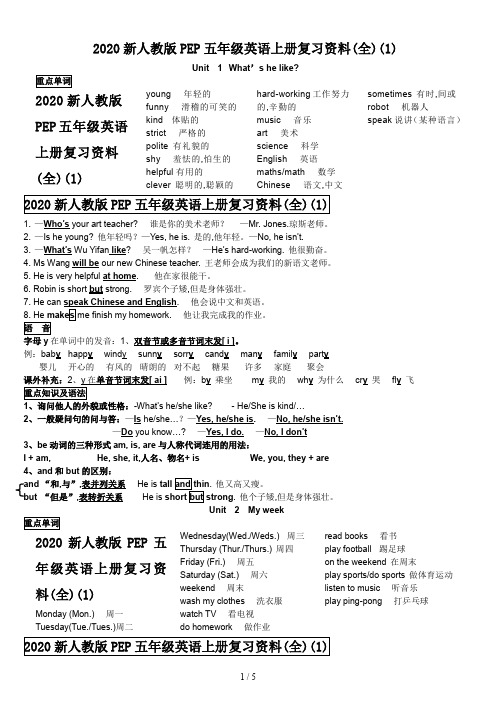
2020新人教版PEP 五年级英语上册复习资料(全)(1)Unit 1 What ’s he like?2020新人教版PEP 五年级英语上册复习资料(全)(1) young 年轻的 funny 滑稽的可笑的 kind 体贴的 strict 严格的 polite 有礼貌的 shy 羞怯的,怕生的 helpful 有用的clever 聪明的,聪颖的 hard-working 工作努力的,辛勤的 music 音乐 art 美术 science 科学 English 英语maths/math 数学 Chinese 语文,中文 sometimes 有时,间或 robot 机器人 speak 说讲(某种语言)1. —Who’s your art teacher? 谁是你的美术老师? —Mr. Jones.琼斯老师。
2. —Is he young? 他年轻吗?—Yes, he is. 是的,他年轻。
—No, he isn’t.3. —What’s Wu Yifan like ? 吴一帆怎样? —He’s hard -working. 他很勤奋。
4. Ms Wang will be our new Chinese teacher. 王老师会成为我们的新语文老师。
5. He is very helpful at home . 他在家很能干。
6. Robin is short but strong. 罗宾个子矮,但是身体强壮。
他会说中文和英语。
他让我完成我的作业。
字母y 在单词中的发音:1、双音节或多音节词末发[ i ]。
例:bab y happ y windy sunn y sorr y cand y man y famil y part y婴儿 开心的 有风的 晴朗的 对不起 糖果 许多 家庭 聚会例:b y 乘坐 m y 我的 wh y 为什么 cr y 哭 fl y 飞1、询问他人的外貌或性格:-What’s he/she like? - He/She is kind/…2、一般疑问句的问与答:—Is he/she…?—Yes, he/she is. —No, he/she isn’t.—Do you know …? —Yes, I do. —No, I don ’t3、be 动词的三种形式am, is, are 与人称代词连用的用法:I + am, He, she, it,人名、物名+ is We, you, they + are4、and 和but 的区别:and “和,与”,表并列关系 He is . 他又高又瘦。
2020新人教版PEP五年级英语上册复习资料(全)(1)
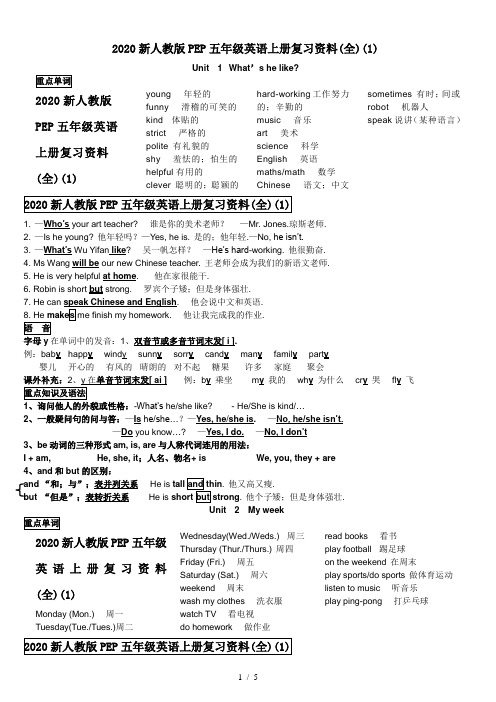
2020新人教版PEP 五年级英语上册复习资料(全)(1)Unit 1 What ’s he like?2020新人教版PEP 五年级英语上册复习资料(全)(1) young 年轻的 funny 滑稽的可笑的 kind 体贴的 strict 严格的 polite 有礼貌的 shy 羞怯的;怕生的 helpful 有用的clever 聪明的;聪颖的 hard-working 工作努力的;辛勤的 music 音乐 art 美术 science 科学 English 英语maths/math 数学 Chinese 语文;中文 sometimes 有时;间或 robot 机器人 speak 说讲(某种语言)1. —Who’s your art teacher? 谁是你的美术老师? —Mr. Jones.琼斯老师.2. —Is he young? 他年轻吗?—Yes, he is. 是的;他年轻.—No, he isn’t.3. —What’s Wu Yifan like ? 吴一帆怎样? —He’s hard -working. 他很勤奋.4. Ms Wang will be our new Chinese teacher. 王老师会成为我们的新语文老师.5. He is very helpful at home . 他在家很能干.6. Robin is short but strong. 罗宾个子矮;但是身体强壮.他会说中文和英语.他让我完成我的作业.字母y 在单词中的发音:1、双音节或多音节词末发[ i ].例:bab y happ y windy sunn y sorr y cand y man y famil y part y婴儿 开心的 有风的 晴朗的 对不起 糖果 许多 家庭 聚会例:b y 乘坐 m y 我的 wh y 为什么 cr y 哭 fl y 飞1、询问他人的外貌或性格:-What’s he/she like? - He/She is kind/…2、一般疑问句的问与答:—Is he/she…?—Yes, he/she is. —No, he/she isn’t.—Do you know …? —Yes, I do. —No, I don ’t3、be 动词的三种形式am, is, are 与人称代词连用的用法:I + am, He, she, it ;人名、物名+ isWe, you, they + are4、and 和but 的区别:and “和;与”;表并列关系 He is . 他又高又瘦.but “但是”;表转折关系 He is . 他个子矮;但是身体强壮.Unit 2 My week2020新人教版PEP 五年级英语上册复习资料(全)(1) Monday (Mon.) 周一 Tuesday(Tue./Tues.)周二 Wednesday(Wed./Weds.) 周三 Thursday (Thur./Thurs.) 周四 Friday (Fri.) 周五 Saturday (Sat.) 周六 weekend 周末 wash my clothes 洗衣服 watch TV 看电视do homework 做作业read books 看书 play football 踢足球on the weekend 在周末 play sports/do sports 做体育运动listen to music 听音乐 play ping-pong 打乒乓球1. —What do you have on Thursday s? 星期四你们上什么课?—I have math, English and music. 我们上数学、英语和音乐课.2. —What do you do on Thursdays, Grandpa? 爷爷;星期四你要做什么?—I have a cooking class with your grandma. 我和你奶奶去上烹饪课.3. —Do you often read books in this park? 你经常在这个公园看书吗?—Yes, I do.是的—No, I don’t.不是4. Look at my picture. 看我的图片.5. You look tired. 你看起来很累.6. You should play sports every day. 你应该每天做运动.语音字母组合ee, ea在单词中的的发音:[ i: ]例:f ee t b ee f m ee t s ee f ee d t ea r ea d ea t rep ea t脚牛肉遇见看见喂养茶阅读吃重复注:1、ee组合绝大部分发长音[ i: ];只有少部分发短音[ i ];如:coffee 咖啡2、ea字母组合除了发[ i: ];还有可能发[ e ]等发音;如:bread 面包;或者发[ ei ];如:great 好极了重点知识及语法1、询问做什么事/活动:—What do you do …? —I often play ping-pong…询问星期几上什么课:—What do you have on…? —We have English class…2、一般疑问句的问与答:—Do you often read books? —Yes, I do. —No, I don’t.3、on+具体某一天(年月日;星期);如:on Monday/Tuesday…课外at+具体时刻(…点钟);如:at 12 o’clock 在十二点整补充:in+大致时间(年月;早中晚);如:in 2014 在2014年in the morning/afternoon/evening 4、play + 球类、棋类、娱乐活动;如:play football/ping-pong补充:play + the + 乐器(第四单元知识);如:play the pipa/piano/violin…Unit 3 What would you like?重点单词2020新人教版PEP五年级英语上册复习资料(全)(1)hamburger 汉堡包tea 茶sandwich 三文治salad 沙拉fresh 新鲜的healthy 健康的delicious 美味的;hot 辣的;辛辣的sweet 含糖的;甜的hungry 饿的thirsty 渴的;口渴的favourite 特别喜爱的food 食物drink 喝;饮carrot 胡萝卜chicken 鸡肉onion 洋葱milk 牛奶bread 面包beef noodles 牛肉面fish sandwich 鱼肉三明治tomato soup 西红柿汤2020新人教版PEP五年级英语上册复习资料(全)(1)1.—What would you like to eat? 你想吃什么?—A sandwich, please. 请给我一个三明治.—What would you like to drink? 你想喝什么?—I’d like some water. 我想喝点水.2. —What’s your favourite food?你最喜欢吃什么食物?—Noodles. They are delicious.面条.面条很好吃.3. My/His /Her favourite food is fish. 我/他/她最喜欢的食物是鱼.4. I’m hungry/thirsty. 我饿/渴了.5. I don’t like beef but chicken is OK. 我不喜欢牛肉但是鸡肉也可以.6. Onions are my favourite vegetable. 洋葱是我最喜欢的蔬菜.7. I like vegetables but not carrots. 我喜欢吃蔬菜但不喜欢胡萝卜.语音字母组合ow在单词中的发音:[ au ]例:[ au ] c ow奶牛fl ow er 花w ow哇d ow n 向下h ow如何;怎样n ow现在sl ow慢的sn ow雪yell ow黄色wind ow窗户sn ow y 下雪的tomorr ow明天重点知识及语法1、询问想要吃/喝什么:—What would you like to eat/drink? —I’d like…2、询问最喜欢的事物:—What’s your favourite food/vegetable/…? —My favourite food/…is…/I like…3、名词复数的规则变化:(1)直接加s ; (2)以s, x, sh, ch 结尾的;加es ;如; bus es box es sandwich es(3)以o 结尾;有生命的加es ;如;potato es tomato es ;无生命的加s ;如;photo s piano s zoo s(4)以辅音加y 结尾;改y 为i 再加es ;如;famil ies bab ies ;以元音加y 结尾;直接加s ;如;boy s day s(5)以f 或fe 结尾;改f 为v 再加es ;如knife-kni ves 小刀 leaf-lea ves 树叶4、some+可数/不可数名词 例:some apple s (可数) some water/rice/juice/bread/…(不可数) 课外补充:不可数名词(词后不可以加-s/es ;所接动词用单数is )液体 water milk tea orange (桔汁) coke juice气体 air (空气) 食物 food rice bread fruit 肉类 meat (肉) fish beef chickenpaper (纸) time music weather (天气)rain snow moneyUnit 4 What can you do?2020新人教版PEP 五年级英语上册复习资料(全)(1) sing English songs 唱英文歌play the pipa 弹琵琶 do kung fu 打功夫 draw cartoons 画漫画 swim 游泳speak English 说英语 cook 烹饪;烹调play basketball 打篮球play ping-pong 打兵乓球 draw pictures 画画clean the classroom 打扫教室1. We ’ll have an English party next Tuesday! 我们下周二将举行英语派对.2. —What can you do for the party? 你能为派对做些什么呢? —I can sing English songs. 我能唱英文歌.3. How/What about you? 你呢?4. Can you do any kung fu? 你会打功夫吗—Yes, I can. 是的;我会. —No, I can ’t.5. No problem . I can help you. 没问题.我会帮你.6. I can play ping-pong, but I can ’t swim. 我会打乒乓球;但我不会游泳.7. Please send me an email at robin@. 请给我发邮件;邮箱robin@.字母组合oo 在单词中的发音:[ u ];[ u: ]例:[ u ] l oo k 看 g oo d 好的 b oo k 书 c oo k 烹饪 w oo d 木头 f oo t 脚助记口诀:1. 看look 好good 书book ;砍柴wood 做饭cook 洗脚foot. 2. 押韵记忆:Look good book, cook wood foot. [ u: ] ball oo n 气球 f oo d 食物z oo 动物园 n oo dles 面条注:字母组合oo 发音少数发短音[ u ];多数发长音[ u: ] .1、询问对方会做什么事情:—What can you do? —I can play the pipa.2、can 句型的否定句:I can ’t play the pipa.3、can 句型的一般疑问句的问与答:—Can you do any kung fu? —Yes, I can./No, I can ’t.4、play + the + 乐器;例 play the erhu /pipa /piano …play + 球类、棋类、娱乐活动;例 play basketball/football/ping-pong …5、some 与any 的异同:不同之处:some+可数名词复数/不可数名词(用于肯定句中)例:I can do some kung fu. 我会打功夫.any+可数名词复数/不可数名词(用于否定句或疑问句中)例:I can ’t do any kung fu. 我不会练武术. Can you do any kung fu?你会练武术吗?Unit 52020新人教版PEP 五年级英语上册复习资料(全)(1)photo 照片;相片plant 植物water bottle 水瓶bike 自行车;脚踏车in front of 在……前面beside 在旁边(附近)between 在……中间behind 在……后面above 在……上面so many 许多their 他们的lots of 许多dirty 肮脏的near 在附近house房屋1. Your room is really nice! 你的房间真漂亮!2. There is a big bed. 有一张床.3. 我的电脑在书桌这里这是我的房间.5. There are so many picture这有许多照片.6. My father can draw very well. 我父亲画的很好.7 .—Where is the ball? 球在哪里?—It’s in front of the dog. 在狗的前面.8. There is a tree in front of the house. 在房子前有棵树.我住在自然公园附近.字母组合ai, ay在单词中的发音:[ ei ]例:r ai ny 下雨的r ai nbow 彩虹p ai nt 涂色w ai t 等待s ay说w ay路;方法birthd ay生日天;日子tod ay今天m ay可以1、there be(is, are)句型的单复数形式:There is a clock. There are lots of flower(12、询问方位或地点:—Where is the ball? —It’s in front of the dog.3、lots of + 可数/不可数名词= a lot of + 可数/不可数名词“许多……”比较:many + 可数名词复数“许多……”例:There are many treemuch + 不可数名词“许多…....”例:I drink much water every day. 我每天喝很多水.4、动词+very well例:My father can draw very well我爸爸画的很好比较:be (am/is/are)+very good例:The book is very good. 这本书非常好.Unit 62020新人教版PEP五年级英语上册复习资料(全)(1)hill 山丘;小山river 河;江mountain 高山;山岳lake 湖;湖泊village 村庄;村镇house 房屋;房子;住宅tree 树;树木;乔木bridge 桥go boating 去划船nature park 自然公园people 人;人们rabbit 兔子duck 鸭子animal 动物high 高的children 孩子们(child的复数形式)2020新人教版PEP五年级英语上册复习资料(全)(1)2. —Is there a river in the forest? 森林里有河流吗?—Yes, there is.是;有的. —No, there isn’t.3. The nature park is so quiet! 自然公园这么安静!many people.没有许多人.自然公园例有高楼吗?—Yes, there are.是;有的. —No, there aren’t.不;没有.6. —How many?多少? —Two. 两个.7. Robin is at Mr. Jones’ house. 罗宾在琼斯先生的房子里.字母组合ou在单词中的发音:[ au ]例:h ou se 房屋;房子m ou se 老鼠s ou nd 声音;听起来c ou nt 数数提示:字母组合ow也有些发[ au ];例:c ow奶牛h ow如何;怎样d ow n 向下there be句型的一般疑问句的问与答:—Is there a lake? —Yes, there is. —No, there isn’t.—Are there any animal s? —Yes, there are. —2、there be(is, are)句型的单复数形式(具体见Unit 5例:There is a nature park near the house. There are many duck3、some与any在肯定句、否定句及问句中的用法:some+可数名词复数/不可数名词(用于肯定句中)any+可数名词复数/不可数名词(用于否定句或疑问句中)4、people人;人们(集体名词;明为单数;实为复数;词末不能加-s)例:There are many people in the park.。
- 1、下载文档前请自行甄别文档内容的完整性,平台不提供额外的编辑、内容补充、找答案等附加服务。
- 2、"仅部分预览"的文档,不可在线预览部分如存在完整性等问题,可反馈申请退款(可完整预览的文档不适用该条件!)。
- 3、如文档侵犯您的权益,请联系客服反馈,我们会尽快为您处理(人工客服工作时间:9:00-18:30)。
新人教版P E P五年级英语上册复习资料(全)新版PEP五年级上册知识点总结Unit 1 What’s he like?old 老的,年纪大的young 年轻的funny 滑稽的可笑的kind 体贴的strict 严格的polite 有礼貌的shy 羞怯的,怕生的helpful有用的clever 聪明的,聪颖的hard-working工作努力的,辛勤的music 音乐art 美术science 科学English 英语maths/math 数学Chinese 语文,中文sometimes 有时,间或robot 机器人speak说讲(某种语言)1. —Who’s your art teacher? 谁是你的美术老师?—Mr. Jones.琼斯老师。
2. —Is he young? 他年轻吗?—Yes, he is. 是的,他年轻。
—No, he isn’t.3. —What’s Wu Yifan like? 吴一帆怎样?—He’s hard-working. 他很勤奋。
4. Ms Wang will be our new Chinese teacher. 王老师会成为我们的新语文老师。
5. He is very helpful at home. 他在家很能干。
6. Robin is short but strong. 罗宾个子矮,但是身体强壮。
7. He can speak Chinese and English. 他会说中文和英语。
8. He他让我完成我的作业。
字母y在单词中的发音:1、双音节或多音节词末发[ i ]。
例:bab y happ y windy sunn y sorr y cand y man y famil y part y 婴儿开心的有风的晴朗的对不起糖果许多家庭聚会课外补充:2、y 在单音节词末发[ ai ] 例:b y 乘坐 m y 我的 wh y 为什么 cr y 哭 fl y 飞1、询问他人的外貌或性格:-What’s he/she like? - He/She is kind/…2、一般疑问句的问与答:—Is he/she…?—Yes, he/she is. —No, he/she isn’t. —Do you know …? —Yes, I do. —No, I don ’t3、be 动词的三种形式am, is, are 与人称代词连用的用法:I + am, He, she, it ,人名、物名+ is We, you, they + are 4、and 和but 的区别:and “和,与”,表并列关系 He is . 他又高又瘦。
but “但是”,表转折关系 He is . 他个子矮,但是身体强壮。
Unit 2 My weekSunday (Sun.) 周日 Monday (Mon.) 周一 Tuesday(Tue./Tues.)周二 Wednesday(Wed./Weds.) 周三Thursday (Thur./Thurs.) 周四 Friday (Fri.) 周五 Saturday (Sat.) 周六 weekend 周末wash my clothes 洗衣服 watch TV 看电视 do homework 做作业 read books 看书 play football 踢足球on the weekend 在周末 play sports/do sports 做体育运动listen to music 听音乐 play ping-pong 打乒乓球1. on Thursday 星期四你们上什么课? —I have math, English and music. 我们上数学、英语和音乐课。
2. 爷爷,星期四你要做什么?—I have a cooking class with your grandma. 我和你奶奶去上烹饪课。
3. —Do you often read books in this park? 你经常在这个公园看书吗?—Yes, I do.是的—No, I don’t.不是4. Look at my picture. 看我的图片。
5. You look tired. 你看起来很累。
6. You should play sports every day. 你应该每天做运动。
字母组合ee, ea在单词中的的发音:[ i: ]例:f ee t b ee f m ee t s ee f ee d t ea r ea d ea t rep ea t脚牛肉遇见看见喂养茶阅读吃重复注:1、ee组合绝大部分发长音[ i: ],只有少部分发短音[ i ],如:coffee 咖啡2、ea字母组合除了发[ i: ],还有可能发[ e ]等发音,如:bread 面包,或者发[ ei ],如:great 好极了1、询问做什么事/活动:—What do you do …? —I often play ping-pong…询问星期几上什么课:—What do you have on…? —We have English class…2、一般疑问句的问与答:—Do you often read books? —Yes, I do. —No, I don’t.3、,如:on Monday/Tuesday…课外’clock 在十二点整补充:,如:in 2014 在2014年in themorning/afternoon/evening4、play + 球类、棋类、娱乐活动,如:play football/ping-pong补充:play + the + 乐器(第四单元知识),如:play the pipa/piano/violin…Unit 3What would you like?ice cream 冰淇淋hamburger 汉堡包tea 茶sandwich 三文治salad 沙拉fresh 新鲜的healthy 健康的delicious 美味的;hot 辣的;辛辣的sweet 含糖的;甜的hungry 饿的thirsty 渴的;口渴的favourite 特别喜爱的food 食物drink 喝;饮carrot 胡萝卜chicken 鸡肉onion 洋葱milk 牛奶bread 面包beef noodles 牛肉面fish sandwich鱼肉三明治tomato soup 西红柿汤重点句子1.—What would you like to eat? 你想吃什么?—A sandwich, please. 请给我一个三明治。
—What would you like to drink? 你想喝什么?—I’d like some water. 我想喝点水。
2. —What’s your favourite food?你最喜欢吃什么食物?—Noodles. They are delicious.面条。
面条很好吃。
3. My/His /Her favourite food is fish. 我/他/她最喜欢的食物是鱼。
4. I’m hungry/thirsty. 我饿/渴了。
5. I don’t like beef but chicken is OK. 我不喜欢牛肉但是鸡肉也可以。
6. Onions are my favourite vegetable. 洋葱是我最喜欢的蔬菜。
7. I like vegetables but not carrots. 我喜欢吃蔬菜但不喜欢胡萝卜。
语音字母组合ow在单词中的发音:[ au ]例:[ au ] c ow奶牛 fl ow er 花 w ow哇 d ow n 向下 h ow如何,怎样 n ow现在sl ow慢的 sn ow雪 yell ow黄色 wind ow窗户 sn ow y 下雪的 tomorr ow明天1、询问想要吃/喝什么:—What would you like to eat/drink? —I’d like…2、询问最喜欢的事物:—What’s your favourite food/vegetable/…? —My favouritefood/…is…/I like…3、名词复数的规则变化:(1)直接加s;(2)以s, x, sh, ch结尾的,加es,如, bus es box es sandwich es (3)以o结尾,有生命的加es,如,potato es tomato es;无生命的加s,如,photo s piano s zoo s(4)以辅音加y结尾,改y为i再加es,如,famil ies bab ies;以元音加y结尾,直接加s,如,boy s day s(5)以f或fe结尾,改f为v再加es,如knife-kni ves小刀 leaf-lea ves树叶4、some+可数/不可数名词例:some apple s(可数) some water/rice/juice/bread/…(不可数)课外补充:不可数名词(词后不可以加-s/es,所接动词用单数is /V-s/es)液体water milk tea orange(桔汁) coke juice 气体air(空气)食物food rice bread fruit 肉类 meat(肉) fish beef chi ckenpaper(纸) time music weather(天气)rain snow moneyUnit 4 What can you do?dance 跳舞sing English songs唱英文歌play the pipa 弹琵琶do kung fu 打功夫draw cartoons 画漫画swim 游泳speak English 说英语cook 烹饪,烹调play basketball 打篮球play ping-pong 打兵乓球draw pictures 画画clean the classroom打扫教室1. We’ll have an English party next Tuesday! 我们下周二将举行英语派对。
2. —What can you do for the party? 你能为派对做些什么呢?—I can sing English songs. 我能唱英文歌。
3. How/What about you? 你呢?4. Can you do any kung fu? 你会打功夫吗—Yes, I can. 是的,我会。
—No, I can’t.5. No problem. I can help you. 没问题。
我会帮你。
6. I can play ping-pong, but I can’t swim. 我会打乒乓球,但我不会游泳。
